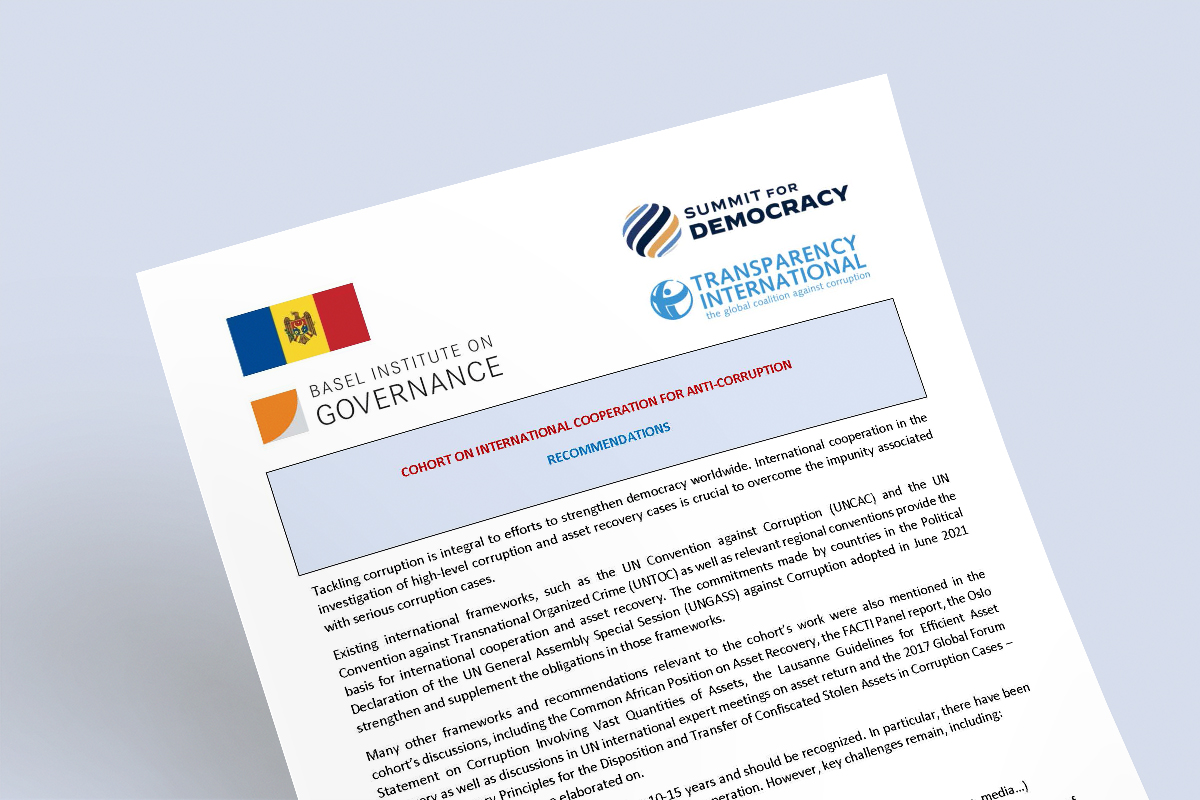Action on international cooperation for anti-corruption: Summit for Democracy recommendations

International cooperation is vital to investigate corruption cases and recover stolen assets, and thus to end the impunity associated with high-level corruption. Few would dispute that, but achieving commitments made under international treaties such as the UN Convention against Corruption (UNCAC) remains a work in progress.
New recommendations by the Summit for Democracy’s International Cooperation for Anti-Corruption Cohort outline how to build on progress in international cooperation made over the last 10–15 years. They seek particularly to overcome challenges related to:
- Non-cooperative territories that continue to offer secret hiding places for illicit money.
- Mutual legal assistance (MLA), widely acknowledged as still too slow, bureaucratic and underfunded in most states.
- Political will to change the status quo.
- Corruption fighting back, through disinformation campaigns and malicious lawsuits against prosecutors, judges and journalists.
The Cohort is a cooperation between the Government of Moldova, Basel Institute on Governance and Transparency International under the Summit for Democracy initiative of US President Biden.
30 steps to better international cooperation
The recommendations cover 30 key actions in four categories:
The first category concerns enhancing compliance with international standards by establishing or strengthening implementation review mechanisms and demanding more accountability from non-cooperative jurisdictions. An annual public reporting mechanism could shine a spotlight on countries’ performance in MLA.
The second deals with widening the scope of international standards and related domestic legislation. This includes recognising grand corruption offences as serious organised crimes, as Transparency International and others have long campaigned. It also includes closing loopholes by implementing centralised beneficial ownership registers (see data on this published by Open Ownership), properly regulating non-financial businesses and professions, and boosting the implementation of asset disclosure requirements for public officials.
This category also covers ways to widen the prosecutor’s toolbox and maximise the amount of assets that can be lawfully recovered. And, vitally, to ensure returned assets are used transparently for the benefit of the people harmed, with adequate remedies for corruption victims.
The third category deals with operational coordination and cooperation between states. It encourages the use of informal channels and networks, available technical assistance offers such as from the Basel Institute or StAR Initiative, early engagement with foreign jurisdictions, and cooperation between law enforcement and non-state actors.
The recommendations also cover ways to externalise cases and to involve more jurisdictions in order to increase the striking power of enforcement.
Enhancing domestic enforcement and asset management capacities is the final and longest category. Actions here range from ensuring enforcement authorities have the necessary powers, independence and resources to providing a safe environment for whistleblowers and other stakeholders to report corruption.
It also offers several technical solutions to better manage recovered assets and promote their transparent use for crime prevention or social purposes.
About the Cohort
The recommendations arise from two workshops bringing together individuals at the leading edge of fighting the type of high-level corruption that transcends borders and threatens democracy.
The broad participation, spanning governments, civil society/non-profit organisations and the private sector, recognises that international cooperation on fighting corruption is a joint responsibility of all those committed to democratic principles and the rule of law.
- See the full recommendations and list of participating governments and organisations.
- Learn more about anti-corruption under the Summit for Democracy initiative
- Watch a video featuring short statements from Gretta Fenner, Managing Director, Basel Institute on Governance; Iulian Rusu, Director, National Anti-Corruption Centre, Moldova; and Daniel Eriksson, CEO, Transparency International.


